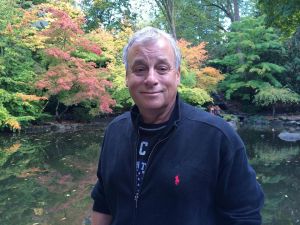Interview with Playwright James Harmon Brown
 James Harmon Brown is an Emmy-Award-winning writer who began his career on the iconic nighttime soap “Dynasty” before moving on to daytime TV as head writer for such series as “All My Children,” “The Guiding Light,” and “Port Charles.” He also co-created the ABC-TV daytime drama “The City.” As a playwright, Brown’s most recent work “The Groyser” was a winner at the 2014 Ashland New Play Festival which is held each year in Ashland, Oregon.
James Harmon Brown is an Emmy-Award-winning writer who began his career on the iconic nighttime soap “Dynasty” before moving on to daytime TV as head writer for such series as “All My Children,” “The Guiding Light,” and “Port Charles.” He also co-created the ABC-TV daytime drama “The City.” As a playwright, Brown’s most recent work “The Groyser” was a winner at the 2014 Ashland New Play Festival which is held each year in Ashland, Oregon.
Prior to his television and playwriting careers, Brown was a staff writer and columnist for the Los Angeles Times. Brown won an Emmy Award as a writer on “The Guiding Light.” He’s also a five-time Emmy nominee and six-time nominee for the Writer’s Guild of America award. He lives in Los Angeles with his wife Doree.
What was your inspiration for this play?
My inspiration for “The Groyser” is my wife and her family. She, like the title character in the play, is the eldest child of Holocaust Survivors. And though the characters, circumstances, and events of the play are entirely fictitious, some of the stories related by the character of Bess did, in fact, happen during my mother-in-law’s time at Bergen-Belson. She, too, had difficulty talking about those experiences to her family…and only later in life agreed to relate some of the horrors she and her fellow survivors endured.
What do you want the audience to come away with?
What I want the audience to come away with is empathy and understanding for three generations of people whose lives were framed by the Holocaust. Bess because she endured it; Dinah because she assumed the burden of hope from a lost generation; and Dinah’s son on whom she placed her own dreams and expectations that could never be entirely fulfilled. It is basically a play about a family working very hard to understand–and be understood by–the people they love.
What projects are you working on now?
As for new projects, I’m working on a short film for Netflix entitled “Meridian” which we plan on shooting this year. I have a screenplay, “Fateful Detour,” which is in the process of securing financing with the plan of being shot in early 2017. And a new one-act play, “Searching For Neil Armstrong,” which we’re doing a staged reading of on March 20 at the Moving Arts Theater in Los Angeles.
What writers inspire you?
My writing heroes begin with Paddy Chayefsky who wrote with such heart, humor, and prescience (take another look at “Network” and see how close he came to what television turned into). I’m also inspired by the work of August Wilson, Harold Pinter and Arthur Miller because their work still touches, resonates and informs no matter how many years have passed since their plays were first seen. While I’m open to–and excited by—theater’s unique ability to experiment…I’m mostly still moved by the well-told story and the beautiful language these and other great writers have given us.
Why did you start writing plays?
I started writing plays around ten years ago in an effort to find my own creative voice. Having written for television for many years–mainly in daytime drama–one is usually writing to a formula and for a group of characters who’ve already been established for the most part. I loved the work and enjoyed the process but nonetheless felt a need to tell my own stories in my own way…and that has been a tremendous experience for me. Hearing your lines and watching your characters come to life in front of a live audience is as rewarding as it gets for a writer. There’s really nothing like it anywhere else.
To put it in perspective: I’ve written some very successful television shows, been nominated for and won an Emmy, but I think the biggest thrill of my professional life was watching a group of fine actors and an outstanding director do a staged reading of “The Groyser” in Ashland, Oregon, as part of the Ashland New Play Festival. They played it exactly as I heard it. And the audience responded in all the ways I wanted them to…with laughter, tears and I hope a little compassion.
What advice do you have for playwrights starting out?
In terms of advice to young writers, I’ll give you the same one-word answer I got more than forty years ago: Read. Read everything… books, plays… anything that inspires you. And if you’re writing for the stage, see as much theater as you can. Because even the bad stuff will teach you something… and the good stuff… especially the great stuff… will inspire you.
